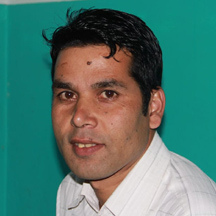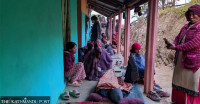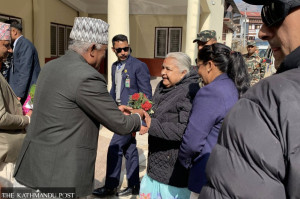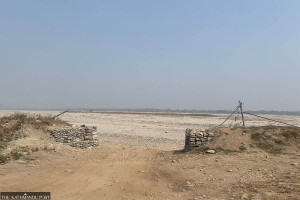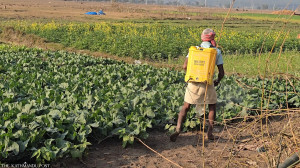Koshi Province
Cable car protest shuts transport in nine eastern districts
Protesters claim the project threatens the environment, Limbu culture, and residents’ livelihoods.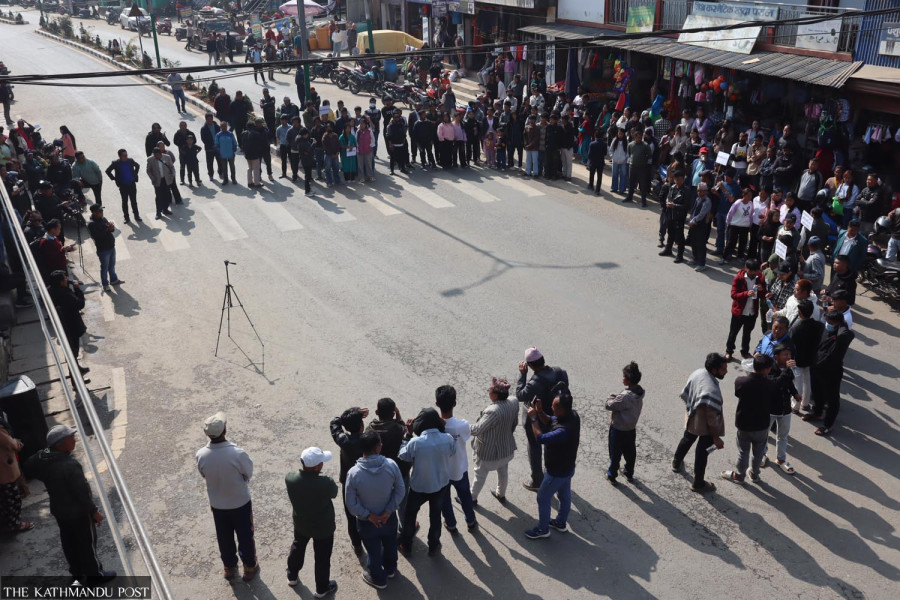
Ananda Gautam
A transport strike enforced against the proposed cable car project in Pathibhara area—known as Mukkumlung region in Kirati scriptures—of eastern Nepal affected life in several hill districts of Koshi Province.
Violent clashes ensued between security personnel and strike enforcers in some places and transport was largely obstructed in the area.
Various organisations and groups enforced the transport strike in nine districts east of the Arun river starting Sunday to protest the construction of a cable car in Pathibhara, a revered shrine in Taplejung district. The strike affected Taplejung, Panchthar, Ilam, Jhapa, Morang, Sunsari, Dhankuta, Tehrathum and Sankhuwasabha districts.
According to Superintendent of Police Dipak Pokhareal, spokesperson at Koshi Province Police Office, on Sunday, eight protesters were arrested in Jhapa, while six were detained in Sunsari.
In Jhapa, violent clashes broke out in Damak during demonstrations. The two-day strike called by the Mukkumlung Conservation Interparty Struggle Committee led to violent confrontations between the demonstrators and police.
According to eyewitnesses, the situation turned tense when protesters started hurling stones at the police, prompting the security personnel to respond with tear gas. Police fired two rounds in the air to disperse the crowd and one tear gas canister to control the situation after protesters became increasingly aggressive.
Superintendent of Police Milan KC confirmed the use of tear gas and claimed that the action was taken after protesters pelted police with stones. Eight protesters were detained during the incident. No serious injuries were reported.
Similarly, the strike affected life in Panchthar district, where vehicular movement was disrupted and marketplaces were partially shut.
The protest, which was part of a broader movement against the construction of the cable car project in the Mukkumlung area, has escalated. The protesters claim that the project would harm the environment, encroach on local culture and disrupt the livelihoods of the residents.
The Mukkumlung Struggle Committee and the Cable Car Project Cancellation Struggle Committee have warned of further protests if the project continues. The Pathibhara Mata Cable Car Company began land levelling for the project earlier this week, sparking outrage among local activists.
Demonstrators vowed to launch stringent protests if their demands are not met, warning of further strikes and demonstrations.
Violence erupted in the Pathibhara region on January 25 as clashes broke out between the ‘No Cable Car Group’ and the security personnel. Two protesters sustained bullet injuries while some others were injured in the clash. The confrontation took place at Baludanda, which is one kilometre from Kaflepati.
The agitating group announced a series of protests demanding that the construction of the cable car line be halted immediately, as well as Pradeep Maden Chandra Sagar Limbu and Laxman Limbu, who were detained last week, be released unconditionally. The agitators have also demanded the withdrawal of the Armed Police Force and Nepal Police teams from Kaflepati.
The agitators enforced a series of protests including a transport strike for five days in Taplejung before organising similar protests in nine other districts on Sunday. Locals, mainly the sick and farmers, have been hardest hit owing to the prolonged transport closure in the area caused by the agitation against the cable car project.
Farmers have complained that they could not sell their products like milk, green vegetables, and poultry, due to the transport closure. Hemsagar Bhattarai, a farmer from ward 3 of Phungling Municipality, said farmers producing milk and vegetables were affected as the market was not functioning due to the disruption.
“I have around 600 chickens ready for sale in the market, but I cannot take them to the market, nor can I bring feed to the poultry farm. What would I do if vehicular movement is disrupted for more days?” said Indra Sunuwar of Dokhu of ward 8 of Phungling Municipality.
A 2.7 km cable car is being constructed from Kaflepati in ward 10 of Phungling to the temple. The agitating groups and individuals have been demanding that Pathibhara Mukkumlung should be preserved in its original state, as it is the heartland of the Limbu community.
The Mukkumlung Struggle Committee, the Cable Car Cancellation Joint Struggle Committee, the Kirat Yakthung Chumlung, and some political forces advocating identity politics including the Rastriya Janamukti Party and the Loktantrik Rastriya Manch have been protesting against cable car project.
Claiming that Mukkumlung has been culturally encroached and transformed into Pathibhara, the agitating groups are demanding that the name Pathibhara be changed back to Mukkumlung.
They claim that Mukkumlung area is the traditional Mundhumi of the Limbu community. The agitators are against the construction of large infrastructure projects at the Mundhumi shrine.
“We are open to a cable car project in other parts of the district. For instance, one can be built from Suketar to Phedi. But we won’t let anyone build a line above Kanchhithan in Pathibhara,” said Khagendra Phembu, Cable Car Cancellation Joint Struggle Committee.
The construction of the cable car line has long been in dispute. The idea was first raised by Olangchung Gola-based traders during King Birendra's visit to the area in 1988. Later, four business persons registered Kanchanjungha Cable Car Pvt Ltd in 1998. But it was left in limbo.
In May 2018, the executive committee meeting of Phungling Municipality gave permission to Pathibhara Mata Darshan Pvt Ltd to construct the cable car as per clause 11 (6) of the Local Government Operation Act, 2017.
Yeti Group later took ownership of the company, and it was subsequently sold to the IME Group led by Chandra Dhakal, the current president of Federation of Nepalese Chambers of Commerce and Industry.
Dhakal, meanwhile, said that he was unaware of past protests against the cable car project. “We acquired the company two years ago to construct the cable car after meeting all the required conditions. It is unfortunate that we have had to face obstacles when we are set to start construction,” he said. He expressed hope that the issue would soon be resolved at the national level.
Phembu, however, claimed that they had protested the cable car construction project much before it came under the Yeti Group’s ownership.
Meanwhile, the government announced a talks team on Sunday evening, led by Home Ministry Joint Secretary Prem Prasad Bhattarai, to negotiate with the cable car protesters.




 18.12°C Kathmandu
18.12°C Kathmandu